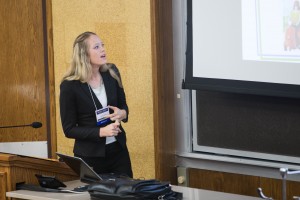
A female college student tiptoes into an engineering class. Her eyes take a wide scan of the room; it’s filled with men. While this may deter or intimidate some, BYU mechanical engineering professor Julie Crockett claims women have just as much to offer engineering as men do. And she wants girls to start learning young.
Starting young
“I really want you to get excited about the types of things I’m excited about,” Crockett said as she began her Education Week class. She explained that engineering topics can be fascinating to young children when presented in the right way. Ordinary occurrences like making pancakes or freezing water can serve as simple, fun engineering lessons for kids.
Crockett emphasized how children’s natural inquisitive and compassionate tendencies mirror an engineer’s mindset. She said engineering is nothing more than seeing a need, developing a solution and solving a problem.
“Is that something that your children have?” Crockett asked. “The ability to recognize needs — but maybe they don’t have the ability to solve them yet?”
Crockett listed ways parents can help children build problem-solving skills and prepare for a career in engineering. She suggested encouraging discovery, supporting children in science projects and fairs, seeking quality math and science programs and finding engineering mentors for children.
She also recommended identifying and capitalizing on interests children already have and finding a way to relate them to engineering. Parents shouldn’t be afraid to nudge children appropriately, according to Crockett.
“Really cool things can happen, but we have to get outside our comfort zone,” Crockett said. “So if you’re starting to see an interest, push your kids a little bit. If you start to get them involved early, then it won’t be as scary later on.”
Women in the engineering workplace
Crockett directed a Q&A panel for the last portion of her class. Lisa Barrager, coordinator of the BYU Women in Engineering & Technology program, responded to a question about the scarcity of women in engineering. To understand how few women work in this field, she said, consider the fact that 11.7 percent of mechanical engineers today are females. Barrager sees immense opportunity in these numbers.
“If you walk into a room where not very many people look like you, then don’t walk away,” Barrager said. “That means there’s opportunity there.”
“Look at all the opportunity,” she continued. “Some of these majors where females are rare are the places to be. They work hard, get fantastic job offers and often end up in leadership positions. They’re in demand. There are lots of opportunities, and so many people want them to work for them.”
Some women in engineering-based jobs face discrimination. But software engineer Cindy Conlin commented during the presentation with words of consolation for those fearing that their daughters might face sexism if they pursued engineering. She claims that if a woman can get the job done, there will be no room for gender-based discrimination.
“Engineering is not that subjective,” Crockett said. “There’s a concrete end product; you can make it, or you can’t. So from my experience, it seems there’s not as much discrimination against women in that field.”
More Education Week articles:
- Marleen S. Williams: Matters of the mind: Facing life’s trying tests
- Elder Bednar: To sweep the Earth as with a flood
- What brings you to Education Week?
- David B. Marsh: Helping those who struggle with doubt
- Steve A. Tersigni: The Word of Wisdom as God’s health plan
- Water main rupture temporarily shuts down Marriott Center during Education Week
- Tom Holmoe on the state of BYU athletics
- Richard B. Miller: The healing power of forgiveness
- Roger K. Allen: How to talk to your children
- Randal A. Wright teaches how to live purposefully with self-discipline
- Education Week: A Week in Photos (Aug. 22, 2014)
- Education Week at a glance




